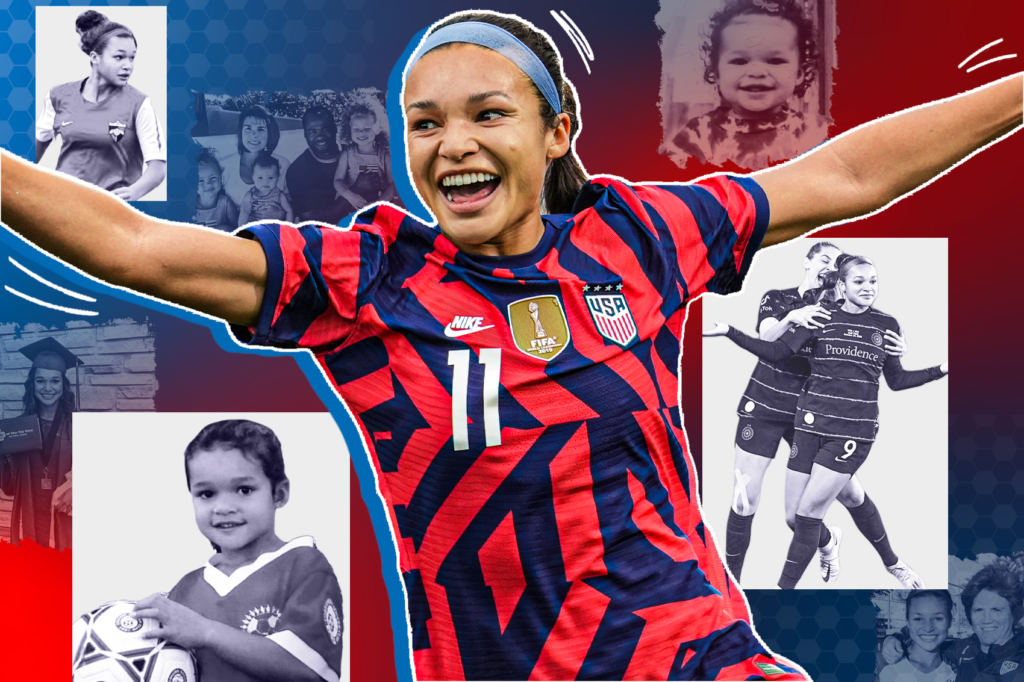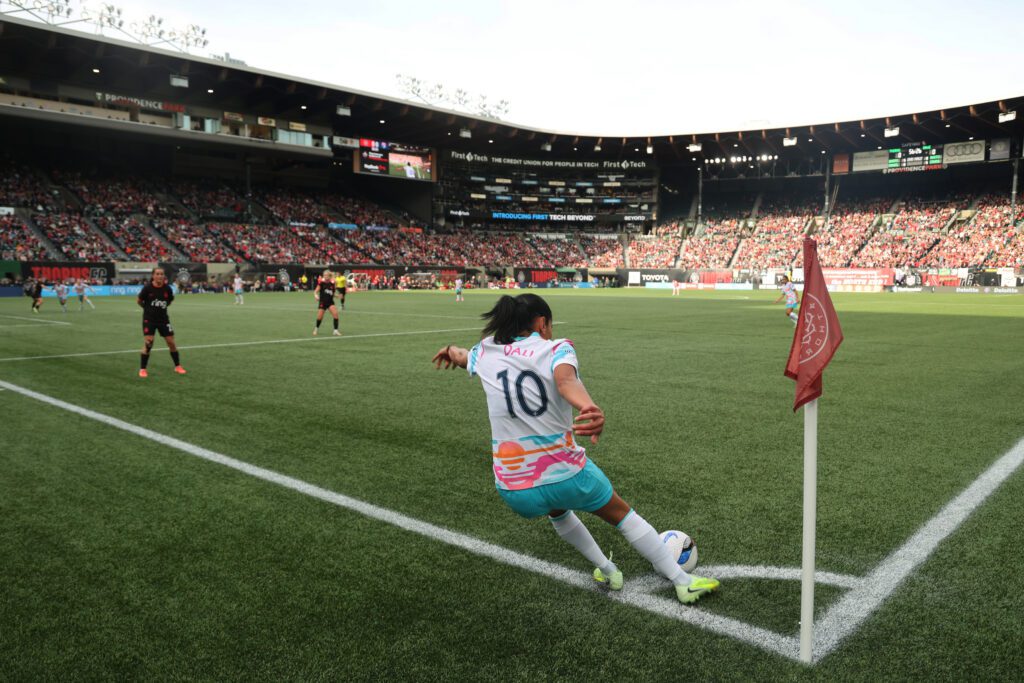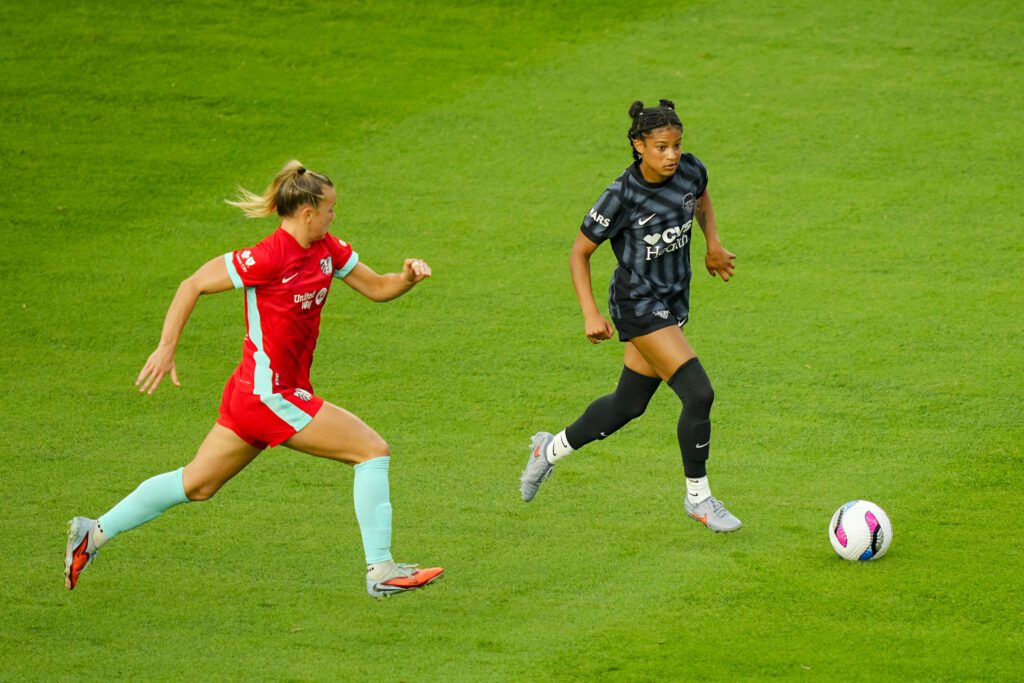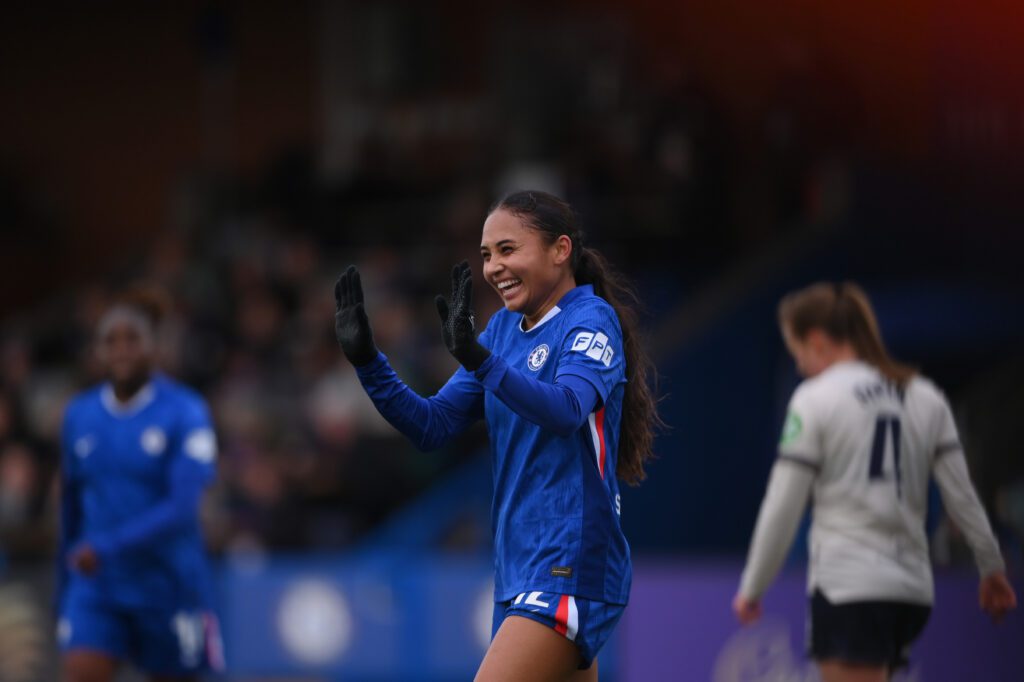Sophia Smith wants more.
She always has. More wins. More goals. More soccer.
It’s why she told her parents when she was 12 that she needed to leave her local club, and drive three hours round-trip every day to play for Real Colorado. Why she once scored seven goals in a half, and then got into an argument with her coach when he took her out.
It’s why she left Stanford after just two seasons, to join the NWSL.
It’s why at 22, she’s regarded as the future and the present when it comes to United States women’s soccer. Why in her third year in the NWSL, she won the 2022 league MVP and Championship game MVP awards.
It’s why Sophia Smith doesn’t like scoring goals, she needs to score goals. The same way she needs food and water. Smith needs to feel the ball hitting cleat, and then see it hitting net.
From the time she started playing soccer, scoring was her focus. Even when coaches at the youth level tried experimenting with positions. If Smith was on the field, she had her eye on the goal. It didn’t matter if she was playing defense, or even if she was wearing gloves and a keeper’s jersey on the opposite side of the field.
Every time she scores, Smith goes through the same progression of emotions. First, she feels relief. Like she can finally exhale. Then she smiles. Soccer, after all, still brings her joy. But those emotions don’t last. She sighs, she smiles, and then Sophia Smith goes back to being determined. Now, it’s time to score again.
That’s why her Michael Jordan-esque shrug celebration in the 2022 NWSL Championship game caught her parents off guard. It was so different from her usual post-goal routine. But like everything Smith does, it came with a purpose.

This time, she was sending a message to those who didn’t think she deserved to win NWSL MVP. The ones that thought someone more seasoned should take home the award. Now wasn’t the time for Smith. Not even after she scored 14 goals for the Portland Thorns in the regular season. Not after she became the youngest player to lead the USWNT in scoring over a calendar year, all but ensuring herself a starting spot on the 2023 World Cup team. Not yet.
But with one goal — that ended up being the game-winner — and one shrug, Smith put the doubts to rest. Now is the time.
Her time.
“That’s that,” she said after the game.
And it was. For once, when she scored, Sophia Smith didn’t want more. She didn’t need more. At that moment, she had done enough.
***
Kenny and Mollie Smith still live in the same Windsor, Colo., home where Sophia and her two older sisters grew up. There’s a small and slightly faded Portland Thorns flag in the front yard near the entrance, but other than that, not much evidence that their youngest daughter is one of the best soccer players in the world.
Instead, the house is full of memories. Pictures of the chubby-cheeked Smith trio as little girls. A yard with a replica of the crab-shaped sandbox they played in, this one being used when the Smith’s two grandchildren come over.
Kenny can point to the spot in the yard where the girls tired themselves out on a trampoline — “Every parent should get their kids one,” he says emphatically. The basement where they used to play Polly Pockets is now full of furniture and bits and bobs that Sophia, Gabrielle and Savannah have left behind between their various moves. The home has crisp white walls and a sectional couch that can seat the whole family. “SportsCenter” plays at a low volume in the background.
Visitors to the Smiths’ cul-de-sac home are offered food, bottled water or iced tea when they walk in the door. Stories and photos are at the ready. And when the girls come home, the house feels complete. People used to tease Kenny about having three daughters and no sons, but he was quick to set the record straight. He’s lucky to have them, he says. Both then and now.

Gabrielle still lives close by, and the Smiths have a playroom for her two young kids. Savannah, who followed her father’s footsteps and played college basketball, now lives in California. And Sophia, the youngest, splits her time between Portland playing for the Thorns or wherever the U.S. women’s national team is posted, and living with her boyfriend, former Stanford and current Arizona Cardinals football player Michael Wilson.
When Sophia — or Sophie, as her family calls her — was born, the Smiths were already experienced parents. But as she grew, they were baffled by their youngest daughter. She made her bed every day before school, lined up her collection of cleats and sorted her toys from smallest to largest. Today, Sophia’s room is a time capsule of her life. Her Stanford championship ring sits in a box by her bed, and on her desk bulletin board, she’s pinned the card from the 2020 NWSL draft that reads: “With the first pick, the Portland Thorns select Sophia Smith.”
To an outsider, the room is spotless, marked by Sophia’s intense organizational skills. But Mollie says Sophia would be disgusted to see its current state — a few boxes on the floor of her closet and a stack of miscellaneous objects on her desk. These things will be cleared out the next time she visits, barring the few items her parents can convince her to keep. Among them are a crate full of her favorite pairs of cleats and sweatshirts from each college she visited.
Growing up, Sophia was a mini adult. Partly because her soccer career demanded it, partly because she wanted to keep up with her sisters, and partly because she was born with the mindset that she could do anything.


When Sophia was 2, the Smiths moved into their family home. One day, sod was delivered for their yard, but a mixup and a holiday weekend meant no workers arrived to lay it, so Kenny and Mollie had to do it themselves. They put their three girls down for a nap and began landscaping. Every few minutes, one of them poked their heads in the door to check on the girls.
But in between those moments of supervision, Sophia woke up. And like the little adult she thought herself to be, Sophia decided to make a snack. Half a corn dog, the remnants of her lunch, sat on the counter. Sophia had seen her parents use the microwave before and must have thought, “How hard can it be?” She climbed up the counter and smashed her chubby toddler fingers on the buttons.
When Mollie came inside minutes later, the house was full of smoke. Their brand-new microwave had melted at the bottom into a teardrop shape, and nestled into the burnt glass was a charred stick.
“We had just moved in and already had to get a new microwave,” Mollie says with a laugh.
Obstacles never mattered to Sophia. Whether it’s defenders on a field or a steep counter, she’s always been determined to conquer them and get what she wants.
***
Sophia started playing soccer because her sisters played soccer, and much of her childhood was spent wanting to be like them. Gabrielle and Savannah are four and five years older than Sophia, so she spent a few seasons watching before she was able to compete.
But those years on the sidelines were formative. At halftime, she would kick the ball with other little siblings, but when the game was going, Sophia was watching.
“I was locked in,” she says.


Gabrielle and Savannah stopped playing soccer in middle school, but this time, Sophia didn’t follow suit.
“We all quickly realized that this is something that I was good at and something that I loved more than anything else,” Sophia says. “This is what I was meant to do.”
In first grade, Sophia’s coaches would give their players stickers when they mastered a new skill, and she amassed quite the collection, but Sophia didn’t need prizes to motivate her. As soon as they got home from practice, she would drag Mollie or Kenny into the backyard.
Eventually, they had to get her a rebounding net so Mollie could avoid further injuries.
“It was terrible playing goalie against her,” Mollie says with a laugh. “I was always ducking, because every time I stuck out my arm or hand, I’d end up hurting it.”
Mollie wasn’t alone in her failed efforts at defending Sophia. Even then, she was strides ahead of her peers. By the time she was a preteen, dominating the local competition wasn’t enough for her. The best players were in Centennial, competing for Real Colorado, an hour and a half drive away from Windsor.
The program, led by Lorne Donaldson, who now coaches the Jamaican women’s national team, is responsible for producing several elite soccer players. In addition to Sophia, Donaldson coached Jaelin Howell and Mallory Swanson.
Playing for Real was never the plan, but when the opportunity arose, Sophia knew it was right for her development.
She doesn’t set goals. At least not in the traditional sense. The awards she won in 2022 weren’t on a vision board, and neither was Stanford or the NWSL. She doesn’t waste her time with the minutiae of greatness. Those steps are impossible to predict, anyway.
“I don’t think I could have pictured a year like last year where everything just went right,” Sophia says.
Instead, she focuses on the big picture. One massive goal with no real end point — being the best.
When Sophia hoisted the NWSL Championship MVP trophy, then-coach Rhian Wilkinson stood next to her star player and prophesied Sophia’s ability to stand alone atop the list of great American players.

“She has that in her,” Wilkinson said.
Sophia knows it, too.
There was no “ah-ha moment.” No red, white and blue confetti dancing in her mind. Sophia had a Fathead poster of Mia Hamm in her room growing up, and Donaldson says that is the closest comparison he can find when people ask who Sophia plays like. But she didn’t fall asleep looking at the poster and dreaming of being better than one of the greatest players in U.S. history.
“There was no exact moment where it clicked,” Sophia says. “As I progressed, and with the success I’ve had, the environments I’ve been in, the players I’ve been exposed to who are the best in the world, who have won World Cups, Olympics, done all of that — it made me realize that I can keep getting so much better.”
Real Colorado was one of the first steps to greatness.
No one told Sophia she had to do it. She figured it out herself, like she always does, and presented the idea to her parents. It was a sacrifice for everyone. For Sophia, it meant leaving school early in order to avoid rush hour, and putting her organizational skills to good use tracking assignments from the car. Mollie got a new job that gave her the flexibility to take Sophia to and from training sessions. The team practiced four or five times a week — not enough for Sophia, who often coaxed Kenny or Mollie into driving her on off days to get extra workouts in.
“I’ll never complain,” Mollie remembers her saying. “I’ll never complain one time. Can I please go down there and play soccer?”
“She understood the commitment,” Mollie says. “And she never did complain.”
***
When the USWNT played Jamaica in the Concacaf W Championship last July, Donaldson tried to warn his players about Sophia.
About her speed, her skill, her hunger to score. They knew she was talented, but they also knew Donaldson had spent years coaching the American star. Perhaps, they thought, he was exaggerating.
It took Sophia just eight minutes to score two goals.
Perhaps he wasn’t.
“Everyone kind of looked at me like, ‘Oh, Jesus Christ. You were more than right.’ And I just shrugged my shoulders,” Donaldson says. “Because I have seen it. I have seen it not once or twice or 10 times. I have seen it hundreds of times.”
SOPHIA SMITH YOU ARE A STAR. 🤩
— Attacking Third (@AttackingThird) July 7, 2022
What a touch and finish from the 21-year-old @ThornsFC phenom. 💪 pic.twitter.com/x6DGuy6TQ3
Donaldson’s first impression of Sophia at 12 is the same first impression she gives now.
“She hates to lose, and she loves to score goals,” he says.
Coaching Sophia is part of his professional highlight reel. Coaching against her?
“Terrible,” Donaldson says. “It’s like a father coaching against his daughter.”
Donaldson is one of the few people in Sophia’s life outside of her immediate family that still call her Sophie. To her boyfriend, and everyone who met her at Stanford, she’s Sophia. To her coaches, and everyone who reads her name on a roster, she’s Sophia. She even asked her grandparents to call her by her full name.
But to Donaldson, she will always be Sophie. He’s watched her grow the same way Mollie and Kenny have. He’s proud of her the same way they are. And he’s fought with her the same way a parent would.
In her early days playing for Real Colorado, the team traveled to Portland to play back-to-back games on a Saturday and Sunday. It was February, rainy and miserable. The conditions didn’t impact Sophia, who scored seven goals in the first half of game one.
Donaldson told Sophia that she wouldn’t be playing in the second half. She’d already done enough.
She pushed back.
Donaldson’s halftime talk to the team went out the window, and instead, he spent 15 minutes arguing with Sophia about whether or not she should keep playing. Donaldson started with the obvious.
We need you for tomorrow’s game, he said.
Sophia responded. She wouldn’t be tired. She could play another half and play tomorrow.
So, Donaldson moved on to a new tactic. He lied.
I know the opposing coach, he said. It would be disrespectful to put you back in.
Sophia had an answer for that, too. It wasn’t her problem. Why was he coaching in this league if he couldn’t handle it?
Donaldson pivoted again.
What if the other team does something stupid, he asked. What if they get mad and break your leg?
If they were going to target her, Sophia retorted, they would have already done it.
No matter how many counterarguments she came up with, Donaldson held firm. Sophia didn’t go back in the game. And she hasn’t forgotten.
“To this day, she hasn’t forgiven me,” Donaldson says with a laugh. “I think she just wanted to see how many goals she could score. She wanted to hit double digits.”
Donaldson couldn’t be mad at Sophia, not even then. That hard-headedness made her great. Players need to be coachable, but they also need to push back. He encouraged her fire.
“I always tell my players, ‘When you are on the field, you have to be a b–ch. Once you get off the field, you can go back to being nice.’ The more of a b–ch you are, the more games you win,” he says.

Sophia’s ability to know when to stoke the fire and when to put it out is part of what makes her an elite goal scorer.
There’s a formula. It starts with natural instinct. Donaldson says you’re either born with it or you’re not. Sophia was. Good technique is a must, but it can always be improved. Instinct can’t. Neither can a sixth sense for the goalkeeper. A true goal scorer can sense where the keeper will be in relation to the net, how they’ll react, and the proper angles to counter their moves.
They also have to be fearless.
Sophia has that, too.
Growing up, Sophia was a bit of a daredevil. She liked to stand at the top of the stairs, yell to whoever was walking by and fling herself onto them.
“No fear,” Mollie says. “She was just expecting, knowing that we would catch her.”
Once, when she was 6, Sophia balanced on her family coffee table to play Wii Dance. It was a glass table with a wooden rim, and Sophia perched herself on the edge of it, stomping her feet. Then, she stepped back and crashed through the glass.
Her little sweatsuit was sliced like it had gone through a shredder, but Sophia was unharmed and unphased.
“She’s not afraid to take chances,” Kenny says. “She’s never worried about making mistakes.”
***
Sophia Smith being named to the USWNT’s 2023 World Cup roster was a foregone conclusion. To most people, at least.
Kenny and Mollie planned to go watch her play in Australia and New Zealand — “If she makes it,” they said back in April. But they don’t make travel arrangements in advance. The family doesn’t take anything for granted. To them, nothing is official until Sophia excitedly forwards them an email, or screenshots her invite and shares it with the group chat, like she does every time she’s tabbed for a national team appearance.
Last year, in addition to all of her NWSL accolades, Sophia Smith led the USWNT in scoring and was named the U.S. Soccer Female Player of the Year.
Sophia excelling on the soccer field is all but expected now, but for the Smiths, these moments never lose their shine.
“It’s always exciting, because it’s her dream,” Mollie says.
There’s a picture of young Sophia Smith and former USWNT star Abby Wambach that circulated the internet last year. The Smiths can’t remember the exact circumstances of the moment. They think it was a Colorado Rapids game where members of the USWNT made an appearance, but the details don’t matter. What matters is that Sophia saw Abby Wambach and insisted on waiting in line for a photo, no matter how long it took.
“She was going to stay there until she met her,” Mollie says with a smile.
well @AbbyWambach, you were a big reason this moment happened for me. you inspired me to follow my dreams. thank you. 🙏🏽 https://t.co/NLNIonyW5y pic.twitter.com/54azfKYIGK
— Sophia Smith (@sophsssmith) December 1, 2020
It’s a memory that reminds the Smiths of just how far Sophia has come, and in a short amount of time.
“It feels like yesterday that we were driving her back and forth to Denver,” Kenny says.
But here she is. About to play in the World Cup for the first time.
It’s been three years since Sophia turned pro, and three years since she made her first senior national team appearance.
The USWNT is experiencing extreme turnover. The 2023 World Cup roster has just nine players who have appeared in previous World Cups, and the few that are on the team — established stars like Megan Rapinoe and Alex Morgan — are much closer to the end of their careers than the beginning. But Sophia is just getting started.
That’s why many have taken to calling her the “future of U.S. women’s soccer,” a moniker that Sophia rejects. She may be the future, but she’s also the now, and she’s ready to prove it.
“I don’t love ‘the future’ saying because I feel like I can do this right now,” she said on a CBS Sports show in April. “I know I’m young, but I don’t think age really has anything to do with it.”
There’s that fire.
It hasn’t gone away. It’s evolved. Sophia’s game has, too.
So far this NWSL season, she has seven goals but also five assists through 12 matches, compared to three assists in a full 20-game season last year. In goals, Sophia is second in the league; in assists, she is first.
When she was younger, Sophia says she felt like a failure if she didn’t score during a game. Now, she’s still scoring, but she’s contributing in other ways as well.
“She can supply, she can be the facilitator now,” Donaldson says. “Which is good. At this level, she’s going to be marked heavily. So she has to find another way to impact the game.”
Sophia is about to turn 23. That’s where the future of U.S. women’s soccer comes in. Because the Sophia that’s about to play in the 2023 World Cup is more than capable, but she’s nowhere near as good as she will be.
“Whatever team she is on, no matter how talented, she is always going to end up being the best player on that team,” says Michael Wilson, Sophia’s boyfriend. “History has shown that. She just wants to be the best at whatever she does.”
***
Every time Sophia comes home to Windsor, people want to see her. Even if they only knew her tangentially growing up, Sophia being home is big news. It’s not every day that your town produces a soccer star.
But Sophia rarely wants to see anyone. She’d rather stay in the house she grew up in. Organize her room. Make coffee with the espresso machine she gave to her mom. Play with her niece and nephew. Call Michael. Take care of the people who’ve always taken care of her.
“She always wants to do the right thing,” Wilson says. “Both on the field and off the field. She’s extremely genuine and has pure intentions. I don’t think you get that from a lot of different people.”
Growing up, Sophia missed out on a lot of teenage milestones in order to play soccer at a high level. She had to quit basketball after her freshman season, she missed dances and sleepovers. But none of that bothered her. Missing moments with her family does.
When she gets on a plane, Sophia takes a video scanning the first class cabin because Mollie likes to see the luxury. She does the same for her sisters when she checks into a fancy hotel. Her niece is trained to look out the door for packages because “Auntie Sophie” sends her toys from Amazon almost weekly. And as a Nike athlete, Sophia ships half of the gear she gets to her sisters.
“They’re people I can trust,” Sophia says of her small circle. “They’ll always have my back. Always support me. Regardless of what I’m doing.”
Family is atop Sophia’s pyramid of priorities. She knows who she is with them.

Sophia is also firm in her identity on the field. She’s playing soccer at the highest possible level, scoring goals, and now facilitating. She’s a proven winner and a tenacious competitor. She’s an MVP and a World Cup participant.
All of that is clear.
But off the field and outside of her bubble, Sophia worries. What else fits into that pyramid? She wonders if she’s doing enough to find herself.
During the pandemic, Sophia discovered a passion for reading. She likes romance novels, her favorite being “Archer’s Voice” by Mia Sheridan, and she will read anything by Colleen Hoover. Sophia loves skincare and shopping. She likes a good cup of coffee — oat milk vanilla lattes are her favorite — and breakfast burritos. She’s still hunting for a good one in Portland.
But often, she feels that it isn’t enough. Often, she wants more.
“My whole life has been soccer,” she says. “When you hear my name, soccer is attached to it. But it’s like, ‘OK, what do you like to do outside of soccer? What are your hobbies? What are your goals in life?’ That’s something that I’m really trying to work through.”
These are the questions she talks about with her inner circle. In her childhood home, or over acai bowls with Michael.
He takes a different approach.
Michael imagines a long career for Sophia where she plays soccer until “she’s 35 at least.”
Then, he says, she will have 65 years to figure out who she is outside of the sport.
“To be the best in the world, you have to put every ounce into it,” Michael says. “Then, when you are done with that, you can figure out the rest.”
Sophia sees a clear division between who she is as a soccer player and who she is off the field. But perhaps there can be some crossover.
That’s what Donaldson sees when he thinks of Sophia’s life after soccer. He thinks of her every time he’s in Jamaica, teaching kids about soccer as a tool to help them out of poverty. He thinks about her when he sees racial divides within our world. He thinks about her when he’s coaching kids who want to be like Sophia, the way she wanted to be like Abby Wambach.
“She’s going to be one of the greatest spokespeople in the future, for female athletes especially,” Donaldson says. “The way she treats kids, the way she looks at life. She’s from a mixed family — her mom is white, her dad is Black — she sees people as people. She doesn’t see people as being separated or segregated.”
***
When the World Cup is over, and Donaldson no longer has to worry about Jamaica playing Sophia and the United States, he wants to sit down with his former player. Just to talk. Not about soccer but about life. He will ask her questions, and maybe she will have answers, maybe she won’t. Maybe her first World Cup will have opened her eyes.
It will change her life. As a soccer player, definitely; as a person, maybe. She might leave Australia and know herself better. And she might not — both are OK. Because Michael is right. She doesn’t need to know, not yet. But she wants to, and when Sophia wants something, she makes it happen.
Kenny and Mollie keep Sophia’s room ready for her in Windsor. Anytime she wants to come home, it’s there, just how she left it. Growing up, she changed it often. An interest in interior design spawned from hours spent playing “The Sims” with Gabrielle and Savannah, and Sophia always had a new idea for her room.
Kenny pulls back the door to show a blank white wall. Sophia used to keep all of her name tags and passes from every camp, tournament and college visit posted on that wall. He’s not sure when she took it down. But at some point, Sophia decided she didn’t need it any more. That part of her life is over, and she doesn’t waste time on the past. She also doesn’t waste time on the future. She’s said as much.
She wants to contribute to the USWNT, now. She wants to score, now. She wants to know who she is, now.
But there’s a spot right between the present and the future. That’s where she is. She’s Sophie and Sophia. The future of U.S. women’s soccer and the present. The answered questions and the unanswered questions.
It’s like when she scores a goal. The instance between relief and refocus. The Jordan shrug.
And though Sophia Smith will always want more, the Jordan shrug of life is not a bad place to be.
Eden Laase is a Staff Writer at Just Women’s Sports. Follow her on Twitter @eden_laase.




